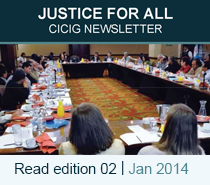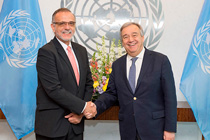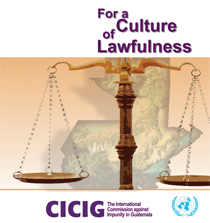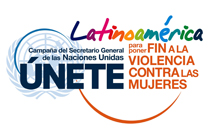PRESS RELEASE 041
CICIG APPEALS ACQUITTAL OF FORMER PRESIDENT PORTILLO AND TWO EX MINISTERS
 Guatemala, May 30, 2011. In accordance with the Code of Criminal Procedure, the International Commission against Impunity in Guatemala (CICIG) filed an extraordinary appeal against the acquittal awarded to former President Alfonso Antonio Portillo Cabrera and former ministers Manuel Hiram Maza Castellanos and Eduardo Arévalo Lacs, both accused of misappropriating GTQ 120 million from the Ministry of National Defense (MDN) in 2001. The appeal was filed before the Administrative Centre of Criminal Management of the Judiciary.
Guatemala, May 30, 2011. In accordance with the Code of Criminal Procedure, the International Commission against Impunity in Guatemala (CICIG) filed an extraordinary appeal against the acquittal awarded to former President Alfonso Antonio Portillo Cabrera and former ministers Manuel Hiram Maza Castellanos and Eduardo Arévalo Lacs, both accused of misappropriating GTQ 120 million from the Ministry of National Defense (MDN) in 2001. The appeal was filed before the Administrative Centre of Criminal Management of the Judiciary.
The special appeal of CICIG cites "clear injustice", that is, the blatant arbitrariness of the judgement issued in the case, which infringes procedural and substantive requirements:
The Constitution and legislation of Guatemala clearly indicate that both the President of the Republic and State ministers, in accordance with their duties, are responsible for handling and administering public funds. The infringement of the substantive requirement cited in the extraordinary appeal concerns the decision of two of the three judges, who deemed that none of the accused parties were responsible for administering State funds. According to the appeal, this constitutes an unsatisfactory interpretation of Section 445 of the Criminal Code—which provides for the crime of embezzlement.
As to the procedural flaws, the judges failed to use valid or logical arguments to reject the evidence presented during the trial (witness statements and expert opinions). Therefore, the appeal cites the violation of sound reasoning rules, that is, the assessment of evidence was not reasonable but whimsical. Furthermore, the appeal indicates that the judges failed to group together evidence during their analysis and also disregarded the overlapping information confirming the prosecution's hypothesis.
Therefore, CICIG, in its appeal, requested that the acquittal be revoked and that the three charged individuals be convicted. CICIG also alternatively suggested that the procedural flaws be acknowledged, thereby revoking the previous ruling, and that a new trial be ordered with different judges.


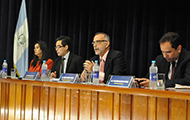
 Guatemala, May 30, 2011. In accordance with the Code of Criminal Procedure, the International Commission against Impunity in Guatemala (CICIG) filed an extraordinary appeal against the acquittal awarded to former President Alfonso Antonio Portillo Cabrera and former ministers Manuel Hiram Maza Castellanos and Eduardo Arévalo Lacs, both accused of misappropriating GTQ 120 million from the Ministry of National Defense (MDN) in 2001. The appeal was filed before the Administrative Centre of Criminal Management of the Judiciary.
Guatemala, May 30, 2011. In accordance with the Code of Criminal Procedure, the International Commission against Impunity in Guatemala (CICIG) filed an extraordinary appeal against the acquittal awarded to former President Alfonso Antonio Portillo Cabrera and former ministers Manuel Hiram Maza Castellanos and Eduardo Arévalo Lacs, both accused of misappropriating GTQ 120 million from the Ministry of National Defense (MDN) in 2001. The appeal was filed before the Administrative Centre of Criminal Management of the Judiciary. 
